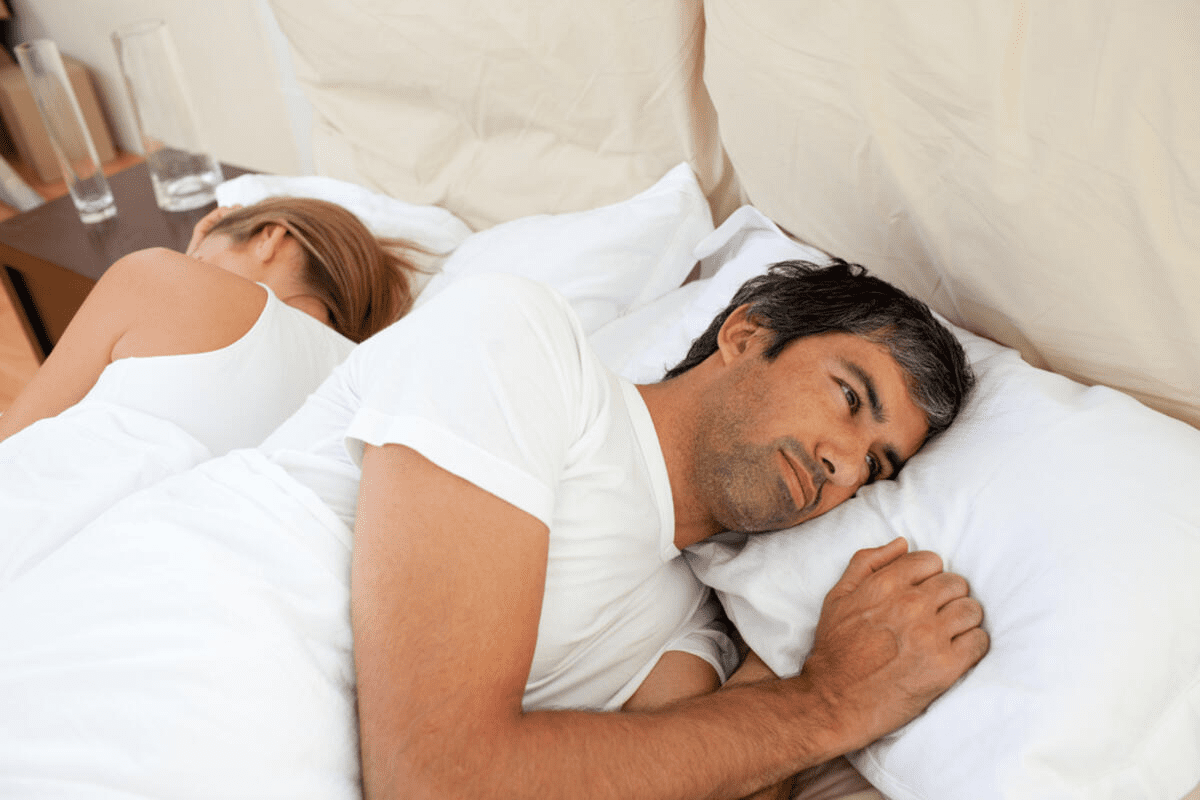
Erectile issues affect many men worldwide. They can harm their well-being and relationships. At Liv Hospital, we know a healthy erection is key for a good life.Can stress cause erectile dysfunction? Learn how chronic life stress, not just performance anxiety, impacts your ability to get and maintain an erection.
Managing stress is key to solving erectile problems. We see that erectile health is more than physical. It also includes emotional and mental health. Our approach combines stress management with medical care for the best results.
Key Takeaways
- Understanding the link between stress and erectile issues is vital for effective management.
- A patient-centered approach can lead to better outcomes in treating erectile problems.
- Stress management is a critical component of addressing erectile health.
- Comprehensive care involves both medical treatment and emotional support.
- Improving erectile function requires a holistic approach.
Understanding Erectile Function: The Basics
Erectile function is complex, involving blood flow, nerve signals, and hormones. To grasp erectile dysfunction (ED), we must first understand how erections happen.
The Physiology of an Erection
An erection is a complex process. It involves the nervous system, blood vessels, and hormones. When a man is sexually aroused, his brain sends signals to the penis.
The nerves cause the blood vessels to relax and widen. This lets blood flow into the penis. The blood fills the spongy tissues in the penis, causing an erection.
Blood flow is key for an erection. The blood flow into the penis, combined with vein compression, traps blood. This results in an erection.
Common Causes of Erectile Difficulties
Erectile dysfunction can stem from health issues, lifestyle, and psychology. Common causes include:
- Cardiovascular disease
- Diabetes
- High blood pressure
- Obesity and lack of physical activity
- Smoking and excessive alcohol consumption
- Stress, anxiety, and depression
A study in the Journal of Sexual Medicine says, “Erectile dysfunction is a multifactorial disorder. It needs a complete approach to diagnosis and treatment.”
“Erectile dysfunction is a multifactorial disorder that requires a complete approach to diagnosis and treatment.”
The Prevalence of ED Among American Men
About 20 percent of men face erectile dysfunction. ED’s prevalence grows with age. It affects 40% of men at 40 and 70% by 70.
Age Group | Prevalence of ED |
40 years | 40% |
50 years | 55% |
60 years | 65% |
70 years | 70% |
Knowing ED’s prevalence and causes is vital for effective treatments. By tackling the root causes, men can enhance their sexual health and overall well-being.
Can Stress Cause Erectile Dysfunction?
Stress and erectile dysfunction are linked in complex ways. Both psychological and physical factors play a role. Stress affects how well a man can get an erection, making it a key issue to tackle.
The Statistical Link Between Stress and ED
Research shows a strong link between stress and erectile dysfunction. Men under high stress often struggle with getting or keeping an erection. A study in the Journal of Sexual Medicine found this to be true.
Fight-or-Flight Response and Sexual Function
Stress triggers the fight-or-flight response. This prepares the body to face or flee danger. It also reduces sexual drive and erectile ability.
Stress hormones like cortisol and adrenaline can block the body’s ability to get an erection. This makes it hard to achieve or keep an erection.
How Acute vs. Chronic Stress Affects Erections
Acute and chronic stress have different effects on erections. Acute stress, being short-term, might only briefly affect a man’s ability to get an erection. But chronic stress, lasting long-term, can harm sexual function and lead to erectile dysfunction.
Chronic stress can also mess with hormone levels, including testosterone. This hormone is key for healthy erections. Knowing the difference between acute and chronic stress is important for treating stress-related erectile issues.
By understanding how stress affects erections, people can start to improve their sexual health. This is a first step towards bettering their overall well-being.
The Stress-Erection Connection: Biological Mechanisms
Stress and erections are linked through cortisol, testosterone, and blood vessel health. Stress triggers our body’s “fight-or-flight” response. This leads to many changes in how we feel and function.
Cortisol and Testosterone: A Delicate Balance
Too much stress raises cortisol levels. This can upset the balance of hormones, including testosterone. This imbalance can make it hard to get an erection.
Testosterone is key for erections. But, high cortisol can lower testosterone. This makes it even harder to get an erection.
Vascular Effects of Chronic Stress
Stress also harms blood vessels. It can raise blood pressure and heart rate. This makes it tough to get and keep an erection.
Vascular Factor | Effect of Chronic Stress | Impact on Erection |
Blood Pressure | Increased | Reduced blood flow to penis |
Vascular Function | Impaired | Difficulty achieving erection |
Endothelial Health | Damaged | Reduced nitric oxide production |
Neurological Pathways Affected by Stress
Stress also messes with the nerves that control erections. Stress hormones can change how our nervous system works. This affects the signals needed for an erection.
The connection between stress, hormones, blood vessels, and nerves shows why treating erectile dysfunction needs a full approach.
Psychological Factors: Beyond Physical Stress
Physical factors are not the only cause of erectile dysfunction. Psychological factors also play a big role. The mind and body are connected, and our thoughts can affect our sexual health.
Performance Anxiety and Its Impact
Performance anxiety is a big psychological factor in erectile issues. Feeling anxious about sex can make it hard to get or keep an erection. This worry can come from past experiences, fear of not doing well, or feeling pressured.
This anxiety can make it tough to get fully erect or keep an erection long enough for sex. It’s a big problem for many people.
Depression, Anxiety, and Erectile Function
Depression and anxiety can really hurt your sex life. Depression can make you less interested in sex and harder to get erect. Anxiety can make you too stressed to keep an erection.
It’s a cycle where your mental state affects your sex life, and sex problems make your mental state worse. Getting help for these issues is key to better sex.
Breaking the Cycle of Worry and ED
To break the cycle of worry and ED, you need to tackle both mind and body. Stress management, like mindfulness, can help. It can make you less stressed and improve your sex life.
Talking openly with your partner can also help. It can reduce the anxiety and pressure around sex. Getting help from a doctor or therapist can give you the tools to overcome these psychological barriers.
Understanding and tackling the psychological side of ED can greatly improve your sex life. It’s a big step towards feeling more confident and better overall.
Lifestyle Modifications for Better Erections
Simple changes in your lifestyle can greatly improve your erections. Adding healthy habits to your daily routine can boost your erectile function and overall health.
Exercise and Physical Activity
Regular exercise is key to good health and better erections. It improves blood flow, raises testosterone, and strengthens your heart. All these are important for a strong erection.
Research shows that active men face less erectile issues. Aim for 150 minutes of moderate exercise or 75 minutes of vigorous exercise weekly. Brisk walking, cycling, or swimming are great choices.
Exercise Type | Benefits for Erectile Health |
Aerobic Exercise | Improves cardiovascular health, enhances blood flow |
Resistance Training | Boosts testosterone levels, improves overall muscle strength |
High-Intensity Interval Training (HIIT) | Enhances cardiovascular health, improves insulin sensitivity |
Nutrition and Dietary Considerations
Eating a balanced diet is vital for erectile health. Include fruits, veggies, whole grains, and lean proteins. Omega-3 fatty acids, antioxidants, and zinc are key for blood flow and testosterone.
Try to eat less processed foods, saturated fats, and sugars. A healthy diet and regular exercise can greatly enhance erectile function.
Sleep Quality and Sexual Health
Good sleep is essential for sexual health. Poor sleep can mess with hormone levels, including testosterone. Aim for 7-9 hours of quality sleep nightly to support erectile health.
Reducing Alcohol and Quitting Smoking
Too much alcohol and smoking can harm erections. Cutting down on alcohol and quitting smoking can greatly help. Limit alcohol to moderate levels (up to two drinks daily for men) and seek help to quit smoking.
By making these lifestyle changes, men can improve their erections and overall health. If you’re having trouble with erections, talk to a healthcare professional for a personalized plan.
Effective Stress Management Techniques
Managing stress well is key to keeping erectile function healthy. Chronic stress can cause erectile dysfunction and difficulty staying hard. We’ll look at stress management techniques to help.
Mindfulness and Meditation Practices
Mindfulness and meditation can lower stress and boost well-being. They focus on the now, not past or future worries. Regular practice can lower cortisol, helping erectile health.
Studies show mindfulness can improve sex by reducing anxiety and boosting emotional connection. Start with short daily exercises to make it a habit.
Breathing Exercises for Acute Stress
Breathing exercises are simple yet effective for stress. Diaphragmatic breathing calms the fight-or-flight response, reducing stress hormones and promoting relaxation.
- Practice deep, slow breaths in through the nose and out through the mouth.
- Focus on the sensation of the breath moving in and out of the body.
- Use breathing exercises during moments of stress or anxiety to calm the body.
Progressive Muscle Relaxation
Progressive muscle relaxation involves tensing and relaxing muscles. It reduces physical tension and promotes calm, helping with erectile dysfunction.
To practice, tense your toes, hold for a few seconds, then release. Move up the body, tensing and relaxing each group.
Cognitive Behavioral Approaches
Cognitive behavioral therapy (CBT) helps with erectile dysfunction’s psychological side. CBT changes negative thought patterns that cause stress and erectile issues.
With a therapist, you can learn to change negative thoughts, build confidence, and have healthier attitudes towards sex. This can improve erectile function and sexual well-being.
Natural Remedies and Supplements
Natural methods and supplements are getting attention for helping with erectile issues. It’s key to look at the evidence for these options.
Evidence-Based Herbal Supplements
Herbal supplements like Ginseng are being studied for erectile help. Asian ginseng boosts nitric oxide, which is important for erections.
L-arginine is also in the spotlight. It helps make nitric oxide and may improve erectile function, studies say.
Vitamins and Minerals for Sexual Health
Vitamins and minerals are important for health, including sex. Vitamin D is linked to better erectile function, with low levels possibly causing issues.
Zinc is key for sex health. It helps make testosterone and affects sperm and libido. Getting enough zinc can help with erections.
Nutrient | Role in Sexual Health | Food Sources |
Vitamin D | Supports erectile function | Fatty fish, fortified dairy products |
Zinc | Critical for testosterone production | Oysters, red meat, poultry |
Cautions and Considerations with Supplements
While supplements can help, it’s important to be careful. The quality and safety of supplements vary a lot because of limited rules.
Always talk to a doctor before starting supplements, even more so if you’re on meds or have health issues. Some supplements can react with meds or make health problems worse.
Being informed and careful helps people make smart choices about using natural remedies and supplements for erectile health.
Relationship Dynamics and Communication
Erectile dysfunction can deeply affect relationships. It’s important to talk openly about it. ED impacts not just the person with it but also their partner and the relationship’s dynamics.
Talking to Your Partner About ED
Talking about erectile dysfunction is a big step. It’s key to do it with empathy and understanding. Avoid blaming or pressuring each other. By sharing your feelings, you can find ways to improve your intimacy.
Creating a safe and supportive environment for this conversation is key. Pick a private and comfortable spot. This way, both of you can feel free to express your thoughts.
Creating a Supportive Sexual Environment
A supportive sexual environment can help a lot. It’s about being open to different ways of being intimate. This means not just focusing on getting an erection.
Strategies for a Supportive Environment:
- Try non-penetrative activities that you both like.
- Focus on foreplay and other forms of intimacy.
- Experiment with different positions or techniques.
Exploring Intimacy Beyond Penetration
Intimacy isn’t just about penetrative sex. There are many ways to connect with your partner. Finding these alternatives can keep your sexual relationship fulfilling despite ED.
Some ways to explore intimacy beyond penetration include:
- Oral sex
- Mutual masturbation
- Using sex toys together
- Engaging in sensual massage
Couples Therapy Options
Couples therapy can help a lot. A therapist can guide you on how to talk about ED and build intimacy. They can also help with coping mechanisms.
Benefits of Couples Therapy:
Benefit | Description |
Improved Communication | Learning how to effectively discuss ED and its impact on the relationship. |
Enhanced Intimacy | Exploring new ways to connect and be intimate beyond penetrative sex. |
Coping Strategies | Developing strategies to manage the emotional aspects of ED. |
By tackling erectile dysfunction together, you can strengthen your bond. This can improve your overall well-being.
Conclusion: Reclaiming Your Sexual Confidence
Starting to feel confident about sex again means understanding how stress affects erections. Knowing this can help you tackle the main reasons for your erection problems.
Stress-busting activities like mindfulness and meditation can really help your erections. Also, living a healthy lifestyle, with exercise and a good diet, boosts your overall health. This can lead to better erections.
Talking openly with your partner is key to overcoming erectile issues. A supportive and understanding relationship helps you explore intimacy in new ways. It also strengthens your bond.
By using these tips every day, you can regain your sexual confidence. It’s important to tackle erectile dysfunction with a full plan. This includes managing stress, living healthy, and talking openly with your partner. This way, you can improve your sexual health and overall life quality.
FAQ
What is the link between stress and erectile dysfunction?
Stress can harm erectile function by messing with hormones and blood flow. We dive into this complex link in our discussion on stress and ED.
How does cortisol affect testosterone production and erectile function?
Cortisol, a stress hormone, can mess with testosterone levels. Testosterone is key for erections. High cortisol can lower testosterone, causing erectile issues.
What lifestyle modifications can improve erectile function?
Exercise, a healthy diet, and enough sleep help erections. Cutting down on alcohol and quitting smoking also helps.
How can stress management techniques help with erectile dysfunction?
Mindfulness, breathing, and cognitive therapy can manage stress and improve erections. These practices help cope with stress and boost well-being.
Are there any natural remedies or supplements that can support sexual health?
Some herbal supplements and vitamins may help erections. But, always talk to a doctor before trying new supplements.
How can I discuss erectile dysfunction with my partner?
Talk openly and honestly. A supportive environment helps discuss ED and intimacy. Couples therapy can also help with communication.
What are some common psychological factors that contribute to erectile dysfunction?
Anxiety, depression, and performance anxiety can cause ED. Stress management and open talks can help overcome these issues.
Can anxiety and depression cause erectile dysfunction?
Yes, anxiety and depression can lead to ED. They affect mental health, causing low libido and ED.
How can I improve my overall sexual health and well-being?
Use stress management, make lifestyle changes, and talk openly with your partner. These steps promote sexual health and well-being.
Why do I lose my erection during sex?
Reasons include anxiety, stress, and health issues. Managing stress can help maintain an erection.
What does it mean if I’m having trouble getting hard?
Trouble getting hard might mean an underlying health issue like ED. Seeing a doctor is key to finding and fixing the problem.
References
- Mandel, I., Dykstra, J., & Mandel, K. S. (2020). Urinalysis. In StatPearls. StatPearls Publishing. https://www.ncbi.nlm.nih.gov/books/NBK557685/




































